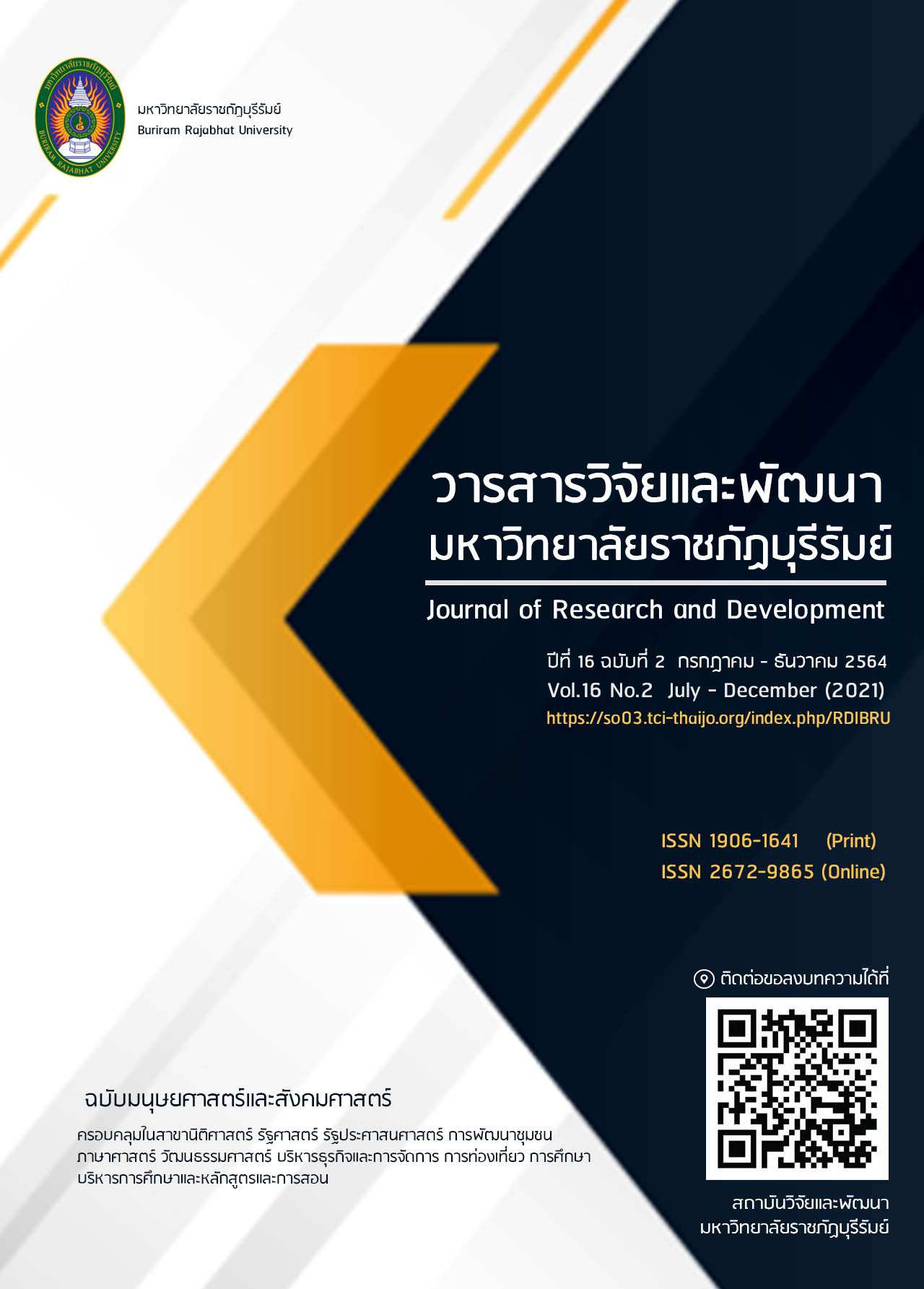Local Community Development Based on Cultures to Reduce Social Disparities
Main Article Content
Abstract
This academic article on developing local community based on cultures to decrease social disparities presented the national development framework according to the 20-Year National Strategy Development Plan and the 12th National Economic and Social Development Plan, which emphasizes cultural-based community development by promoting the development of the foundation economy to become food, souvenir, and tourism in the community. These were done to create occupations, reduce inequality, and construct social justice in order to meet the national development strategy under the term stability, wealth, and sustainability. Therefore, this article presented the following 5 ways to reduce social inequality based on culture: 1) Developing People in the Community, 2) Focusing on Community-based Development, 3) Developing Modern Skills. 4) Lesson Summarizing, and 5) Building Network Partners. Developing the community based on culture to be a strong foundation of society, building knowledge and understanding of their potential, and preparing them to be self-reliant must construct the knowledge and understanding of changes that affect the community under the term, “equality.” Cultural knowledge is an important mechanism for social innovation. Encourage the people to be creative and able to apply the knowledge wisely based on the word, Cultural Code” or Creative DNA of their own, which is an intellectual property that has been accumulated from their ancestors. Moreover, the people should apply knowledge to make the utmost benefit for nation development in the present and in the future.
Article Details
เนื่อหาและข้อมูลในบทความ เป็นความรับผิดชอบของผุ้แต่ง
บทความในวารสารเป็นลิขสิทธิ์ของวารสารวิจัยและพัฒนา มหาวิทยาลัยราชภัฏบุรีรัมย์
References
กมล ตราชู. (2561). การจัดการเพื่อการพัฒนาชุมชนและท้องถิ่น. วารสารจัดการศึกษาเพื่อพัฒนาท้องถิ่น มหาวิทยาลัยราชภัฏสารคาม. 1 (1) ; 13-20.
กัลยาณมิตร นรรัตน์พุทธิ. (2562). วัฒนธรรมคุณค่าสู่มูลค่า. วารสารวัฒนธรรม. 57 (4) ; 3-17.
ชนัดดา ชินะโยธิน. (2558). โครงการอันเนื่องมาจากพระราชดำริในความสัมพันธ์ไทย-ลาว. วารสารศูนย์ศึกษาเอเชียตะวันออก. 15 (2) ; 2-29.
ณรัชช์อร ศรีทอง. (2558). กระบวนการสร้างชุมชนที่เข้มแข็งพึ่งตนเองได้อย่างยั่งยืน.กรุงเทพฯ : โอเดียนสโตร์.
เทศา ธรรมชน. (2555). ประชาธิปไตยต้นแบบ. กรุงเทพฯ : สยามความรู้.
นันทิยา หุตานุวัตร และณรงค์ หุตานุวัตร. (2551). คิดกลยุทธ์ด้วย SWOT. (พิมพ์ครั้งที 7). อุบลราชธานี : มหาวิทยาลัยอุบลราชธานี.
นุชเนตร จักรกลม. (2561). SMEs 4.0 มั่นคง มั่งคั่ง ยั่งยืน. อุตสาหกรรมสาร วารสารของกรมส่งเสริมอุตสาหกรรม. 60 (ฉบับพฤศจิกายน - ธันวาคม) ; 5-7.
บัวตะวัน มีเดีย. (2561). หมู่บ้านอุตสาหกรรมสร้างสรรค์. วารสารของกรมส่งเสริมอุตสาหกรรม. 60 (ฉบับเดือนกรกฎาคม – สิงหาคม). ; 7-16.
ปรเมธี วิมลศิริ. (2560). ขับเคลื่อนแผนฯ 12 สู่อนาคตประเทศไทย. วารสารเศรษฐกิจและสังคม. สำนักงานคณะกรรมการพัฒนาการเศรษฐกิจและสังคมแห่งชาติ. 54 (2) ; 2-6.
_______. (2560). ไม่ทิ้งใครไว้ข้างหลัง สร้างสังคมเป็นธรรมและเข้มแข็ง.วารสารเศรษฐกิจและสังคม. 54 ( 3) 8.
ปุรินทร์ นาคสิงห์ และอังกูร หงส์คณานุเคราะห์. (2561). การทำให้สงกรานต์กรุงเทพฯ เป็นสินค้าวัฒนธรรมในอุตสาหกรรมการท่องเที่ยว. วารสารมานุษยวิทยา. 1 (1) ; 159-190.
พลเดช ปิ่นประทีปและคณะ. (2558). วิสัยทัศน์ 2035 หนึ่งศตวรรษ อภิวัฒน์ประเทศไทย. กรุงเทพฯ : สำนักงานประสานพัฒนาสังคมสุขภาวะ.
ยงจิรายุ อุปเสน. (2557). การสร้างเป้าหมายตัวชี้วัดความสุขชุมชน. กรุงเทพฯ : มูลนิธิหัวใจอาสา.
วิทยา คามุณี. (2561). องค์กรประชาสังคมและทุนทางสังคมเพื่อลดความเหลื่อมล้ำทางสังคมและสำเร็จของประชาธิปไตย.วารสารพิกุล. 16 (2) : 253-281.
สถาบันพระปกเกล้า. (2562). ก้าวข้ามความเหลื่อมล้ำความท้าทายของสังคมไทย. กรุงเทพฯ : สถาบันพระปกเกล้า.
สมศักดิ์ สามัคคีธรรม. (2551). การพัฒนาการจัดการความขัดแย้งกรมีส่วนร่วมและสังคมเข้มแข็ง.กรุงเทพฯ : นิวส์ เมคเกอร์
สุริชัย หวั่นแก้ว. (2554). โลกาภิวัตน์กับความรู้ท้องถิ่นโจทย์ท้ายทายต่อมหาวิทยาลัยในยุคสังคมความเสี่ยง. วารสารสังคมศาสตร์ มหาวิทยาลัยวลัยลักษณ์. 4 (4) ; 16-46.
เสรี พงศ์พิศ (2551). แนวคิดแนวปฏิบัติยุทธศาสตร์พัฒนาท้องถิ่น. กรุงเทพฯ : พลังปัญญา.
Fairclough, N. (2010). Critical Discourse Analysis: The Critical Study of language. 2nd ed. New York: Longman
Plsek Paul E. (1997). Creative,Innovation,and Quality. Miwaukee,Wis. : ASQC Quality Press.
Hall, S. (2001). Foucault: Power, Knowledge and Discouse. In Discouse Theory and Practice. London. Thousand Oaks and New Delhi: SAGE Publications.
Marger, M. N. (2005). Social inequality : Paterns & proceses New York : McGraw-Hill.
Ranciere,Jacques. (1999). Disagreement : Politics and Philosophy.Trans.Julie Rose. Minneapolis : University of Minneosota Press.
Rhodes, R. A. W. (1997). Understanding governance: Policy Networks, Governance, Reflexivity and Accountability. Open University Press, Buckingham.


